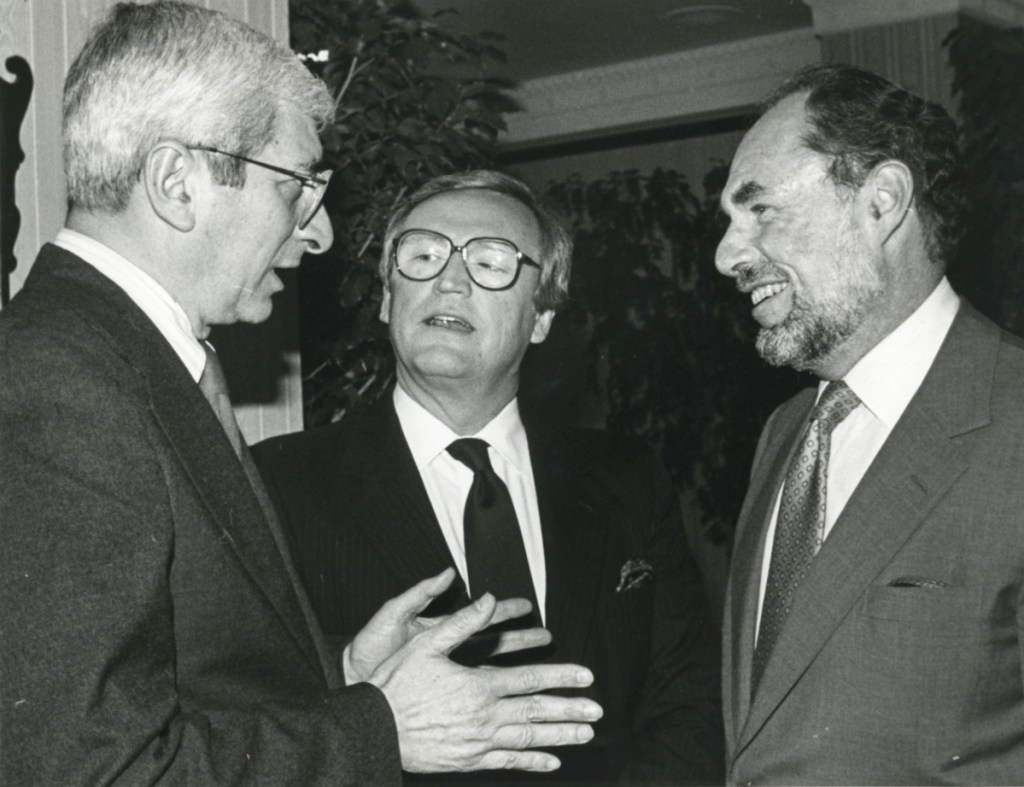Lawrence Grossman, who expanded public television programming as the top executive at PBS in the 1970s and 1980s, and who later led a resurgence of NBC’s news division before budget battles with the network’s corporate bosses forced his departure, died Friday at his home in Westport, Connecticut. He was 86.
He had Parkinson’s disease and oral cancer, said a granddaughter, Rebecca Grossman-Cohen.
As a longtime advertising executive, Grossman was an unlikely choice to lead the ad-free Public Broadcasting Service. But one of his advertising agency’s clients in 1970s had been PBS – his company designed the network’s now-familiar logo featuring the letter P combined with the stylized profile of a head – and he had previously worked at CBS and NBC.
Grossman moved to Washington in 1976 to take charge of PBS, at the time little more than a loosely aligned group of hundreds of locally controlled educational TV stations around the country.
During his eight-year tenure, he maintained financial stability while giving PBS more of a national presence, largely through cultural programming and news.
“Public television is, and will continue to be, indispensable in America,” he said in 1982. “We must continue to be the bulwark of quality that stands firm against the tide of mediocrity and worse which now engulfs so much of television.”
He introduced programs such as “Live From Lincoln Center” and concerts from the White House and Kennedy Center and approved production of a 13-part series on the history of the Vietnam War.
Grossman led efforts that expanded “The MacNeil/Lehrer Report” to a full hour in 1983, making it the first hour-long nightly newscast on any network. (It is now called “PBS NewsHour.”)
Grossman also received credit within PBS for standing up to federal and corporate opposition to a 1980 docudrama, “Death of a Princess,” about a Saudi princess who was beheaded after being accused of adultery.
Grossman resisted efforts by members of Congress, the State Department, the military and Mobil Oil – one of PBS’s largest underwriters – to block the broadcast.
In 1984, despite having no experience in daily journalism, Grossman became the head of NBC News, personally chosen by network chief Grant Tinker. At the time, the network’s news division was slipping in ratings and respect, with its “NBC Nightly News” broadcast in third place behind CBS and ABC, and the onetime morning-show juggernaut, “Today,” trailing ABC’s “Good Morning America.”
Grossman helped engineer a turnaround at NBC within two years, as the “Nightly News” occasionally outranked its competitors, and “Today” became the No. 1 morning show.
He hoped to build on those gains and restore NBC’s news division to its former glory, but in 1986 the network was bought by General Electric. The new corporate leaders instituted across-the-board budget cuts, which Grossman ignored as long as he could. With his onetime patron, Tinker, out of the picture, Grossman often clashed with NBC’s new president, Robert Wright.
He came under growing internal attack by “Nightly News” anchor Tom Brokaw, who questioned Grossman’s journalistic ability. Others pointed out that NBC had failed in several attempts to create a successful TV news magazine.
Grossman was dismissed in 1988. and replaced by Michael Gartner.
Send questions/comments to the editors.



Success. Please wait for the page to reload. If the page does not reload within 5 seconds, please refresh the page.
Enter your email and password to access comments.
Hi, to comment on stories you must . This profile is in addition to your subscription and website login.
Already have a commenting profile? .
Invalid username/password.
Please check your email to confirm and complete your registration.
Only subscribers are eligible to post comments. Please subscribe or login first for digital access. Here’s why.
Use the form below to reset your password. When you've submitted your account email, we will send an email with a reset code.